Book 1, Chapter 10: The Tar and Creosote Factory
List of Chapters | Previous Chapter
It was the day before Easter and the last day of Cronenberg’s Osterkünstlermarkt (Easter artisans’ market). That morning Berthold announced that he and Ursula would take Charlotte and baby Erika to the seamstress to pick up the girls’ dresses for Vigil that night. The order had been placed and paid for a month in advance so that no money would cross the shop counter on Holy Saturday.
“How is it,” Charlotte asked, “that paying for dresses on Holy Saturday is irreligious, but purchasing gifts at the artisans’ market is not?”
Oma Ursula bristled. “It is indecent for a girl of your age to quibble about things you do not understand.”
Freed of the burden of carrying the baby for a few hours, Henrietta planned to accompany her husband and son to the market. Berthold approved. “We shall meet in front of the Rathaus at 1 o’clock and return together to the mansion so we can leave for St. Laurentius by 5 in the afternoon.”
Hermann and Frank wore coats to the market, because the air was chill. Even Henrietta carried a gray Muscovite muff. They wandered through the streets and main square of Old Town, visiting the various booths. There was a great deal of iron-work and woodwork on display, as well as brocaded curtains, tassels, marionettes from Prague, painted eggs from Vienna, decorative steins, Bavarian nutcrackers, Belgian lace, and even Dutch clogs.
Hermann leaned against his wife affectionately, as she examined the small dioramas of the Crucifixion, one of which was exorbitantly expensive because it had been manufactured in Naples and was made of fire coral and mother-of-pearl.
They came to a hut with bright yellow awnings on either side of it where painted wooden schilder (signs) were being sold. The vendor indicated that the artist who made them lived in Munich, and his signature had been burned into the back of each one.
The signs hung on vertical boards covered in dark cloth (to accentuate the colors). Many had religious themes. One showed Christ as an apothecary, dispensing spiritual medicine to his clients, Peter and Paul. There were some with Easter rabbits. And a secular one depicting men and women hiking through a mountain pass with the phrase “Kraft durch Bewegung” (strength through activity) written in Gothic type along the top.
Henrietta pointed to a comical sign and tittered.
“What?” Hermann asked.
It depicted a man dragging a cross with his wife standing on top of it, thrashing him with a horsewhip. The caption read: “The cross would not be so hard to bear / if the angry wife weren’t also there.”
“Papa,” Frank said quietly.
Hermann went to his son as Henrietta walked out from under the awning and went to the booth across the way to browse the silk ribbons and occasional bunting.
“What is it?” Hermann asked.
“I have to piss.”
The vendor overheard. “He can go in the alley over there.”
Hermann nodded and clapped Frank on the shoulder.
“I’ll be back,” Frank said, walking briskly in the direction indicated.
A faint breeze blew through the market, causing the signs to rattle. Hermann was reminded of that night long ago when he had heard the sound of wood clicking on stone and had gone into the valley to investigate, only to find the memento mori that his father had made rocking back and forth on the headstone.
As he thought of this, his eyes lighted on one of the signs, which was itself a variation on the same theme—a mortal reminder. Two cadaverous misers argued over material objects that had no purpose, worth, or use. They were dead, though they did not know it. And the skulls on the walls behind them grinned down on the folly of their wasted lives.
Hermann felt his skin tingle. Something wasn’t right. The hair at the back of his neck stood on end. He glanced uneasily at another sign depicting two farmers in an alpine setting fighting off a massive black wolf.
—And that’s when he heard the howl. He couldn’t tell the direction it had come from. He glanced at Henrietta across the way, but she had not heard it.
Casually he turned and walked toward the alley. He raised his voice without shouting. “Frank?”
—No answer.
He entered between the timber-framed buildings. A paling closed off the other end. There were heaps of rubbish mounted against the walls on either side. But Frank was nowhere to be seen.
“Frank?!”
He strained his eyes in the half-light, scanning the trash piles, pulling up and throwing aside the heaps of spoiled vegetables, kicking over the piled crates. He dreaded what he might find, but panicked when he found nothing.
Then he heard the howl again and ran out of the alley at the very moment a woman’s blood-curdling scream rent the morning air.
Henrietta looked directly at him. He ran to her.
“Where’s Frank?” she asked.
“Stay here,” he mumbled.
“Where’s Frank?” she repeated in an increasingly frantic voice.
He ran through the square as fast as his legs would carry him. “Get out of the way!” he yelled, throwing people aside who stood dumbly in his path.
Others began to move in the direction of the scream. A chorus of shouts and bewildered exhortations filled every intersection and bystreet of Cronenberg. The hubbub grew universal. And Hermann felt his heart beating in his throat.
“What’s happened?!” someone asked.
“The Tar and Creosote Factory!” was the reply.
—The justice of the peace had said that the groundskeeper Karl would be buried in the slime pits behind the Tar and Creosote Factory “where the convicts and anonymous dead are dumped.”
Hermann prayed inarticulately, “O Mother of—Oh God please! No!”
He bolted through the gated arch into the slums where the impoverished immigrants and laborers lived in a labyrinthine and ramshackle warren of rookeries and shanties. A girl and her mother sat wailing in horror on a sidewalk, a trembling man trying to comfort them.
The fumes rolling off the tar-works contributed to the pestilence and disease that plagued this quarter. The factory stood on the north bank of the Wupper, whose waters (even when swollen) were lower than most rivers in Germany. At this time of the year it was waist deep. Smoke billowed from the chimneys, despite it being Holy Saturday, because Minister-President von Bismarck was again threatening to go to war with France.
A rickety pontoon bridge spanned the river, but only pedestrians could traverse it, since it was not sturdy enough for wagons or horses.
A crowd (gasping and murmuring) had gathered at the scene. Hermann forced his way through until he stood at the top of the steps leading down to the pontoon bridge, where he saw the horror exhibited beneath him.
In the middle of the bridge, Berthold and Ursula Landecker lay atop each other, their hearts pierced by a long iron stake with a split-flanged crown. Ursula was on top, a look of astonishment on her lifeless visage.
Hermann tripped down the steps and fell on the bridge’s slick planks, landing on his elbows. He could not feel the pain because something on the gravel bank had seized his attention and caused him to lose his footing.
He pushed himself into the water and waded back toward the shore, as an old woman cried from her second-story window: “It was a wolf!—I saw it with my own eyes!”
A factory worker in a cap shook his fist at her. “You’re senile! It was a man! I saw him as I rounded the corner!”
Hermann lifted a bloody fragment of cloth from the water. It was a piece of the dress Charlotte had worn that morning.
“It was a wolf!” the woman insisted. “It had a baby in its jaws!”
“I swear to you all,” the laborer persisted, “it was a naked man!” He pointed at the corpses on the bridge. “A wolf could not have done that! I saw him! He took the baby and ran through the water to the other side! He went behind the factory!”
Hermann tried to force his way across the river, moving toward a spot of mud where there appeared to be deep footprints. But he stopped because something was bobbing in the water to his left. It was one of Frank’s boots. The leather was shredded, as if it had been mauled.
The crowd interrogated the laborer.
“Yes!” he admitted. “It was a very large man.—And he was hairy! I can see how she might think he had a baby in his mouth, because he held the baby close to his face. But he walked on two legs!”
Everyone looked up at the woman in the window because she was hyperventilating and shrieking at the top of her lungs: “MURDER! MURDER!” She fell backwards into the room, where she was later found dead.
A man plunged into the river and was wading toward Hermann, but the devastated father did not notice him.
“Look to the mother!” someone exclaimed and pointed to Henrietta, who lay writhing on the cobbles.
Hermann tore his shirt when he saw her. Her neck was thrown back and her mouth was bleeding, because she had shattered her teeth when she fell. Her limbs twitched as blood and vomit trickled from her lips. Her eyes rolled back into her head until only the whites could be seen.
Hermann’s knees buckled and he collapsed and might have gone under had not Marty Fitzsimmons hoisted him up.
“Help!” the American shouted, because his right hand was bandaged and he did not have the strength alone to bring Hermann ashore.
Three men jumped in to carry the traumatized father back.
A woman stepped from the wall of the tenement building, which she had been leaning against so as not to pass out. But when she felt her dress peel away from the plaster. She touched her back and looked at her white-gloved hand. It was stained with blood. She screamed, and when she did, the crowd standing under the old woman’s window moved away, revealing a message written in blood on the crumbling plaster.
The last thing Hermann saw before he lost consciousness was an illiterate graffito that read: “LEKKIR, LEKKIR” (yummy-yummy).
His sleep, though dreamless, was punctuated by half-recollected moments of wakefulness to take food and drink.
“It’s wearing off,” he heard Marty say.
When Hermann opened his eyes, he lay in the bed, which he and Henrietta had been sleeping in since the night they fled Tischler House. He was naked under the sheets, except for a cloth fastened snugly around his loins to collect his waste. A brittle cotton pad (stiffened with glue and resin) was stretched underneath him as an added precaution. But he was clean.
The acrid odor of carbolic acid made him wrinkle his nose. Two aproned women moved quietly around the bed, wearing starched frocks and white caps. His arm was lifted, and the doctor who had bandaged his feet stood beside him, taking his pulse and consulting a fob watch in his other hand.
“Can you hear me?” Marty asked.
“Are you speaking to me mentally?” Hermann asked.
“No,” the American said, as the doctor glanced at him quizzically. “Could you leave us for a moment?”
The doctor nodded and withdrew with the nurses.
Marty banked the pillows behind Hermann so he could sit up in the bed. He wasn’t sure how to begin nor what to say. He wiped his brow with his plum handkerchief, and Hermann saw that the bandages on his right hand had been replaced with a fawn glove that gave the false impression that he still had those three missing fingers.
Tears rolled down Hermann’s cheeks. “Tell me it’s not true?”
Marty looked miserable. And the only response he could think of was a quote from Theodore Haak’s translation of Paradise Lost that he had committed to memory the night before: “How didst thou grieve then, Adam, to behold / The end of all thy offspring, end so sad.”
Hermann turned away and clutched at the bedsheets. He spoke in a whisper. “I must prepare for the funeral.”
“The funeral is over.”
“What?!”
“Berthold and Ursula Landecker have been interred in their mausoleum in Elberfeld.”
“Where are my babies?”
“Their bodies have not been recov—”
“They may be alive!”
Marty looked at the floor.
Hermann spoke between clenched teeth. “You can see such things. Are my children alive?”
The American shook his head.
“And Henrietta?”
“She’s here.”
“Take me to her.”
Hermann climbed from the bed but fell, and Marty helped him up. The doctor and nurses came back into the room, having heard the fall. They helped the patient into his robe.
“I want to see my wife.”
The doctor spoke. “I’ve had you intermittently under morphine for nearly three weeks. You’re not in a condition to walk about.”
“Three weeks?!” He looked at Martin. “I gave you no consent to do that to me.”
“It was administered on my orders,” the doctor replied. “You were wild, unmanageable. You might have died of grief.”
“Take me to my wife NOW!”
“The shock of seeing her in her current state may—”
“I’ll be with him,” Marty interceded. Then he tenderly placed Hermann’s arm over his shoulder and communicated to him without the process of language, “I’ll sustain you.”
They left the room that had been Ludwig’s and walked through the corridor, passing Imogene emerging from the master bedroom where Henrietta lay. The Alsatian maid wore at her waist a chatelaine with the mansion’s keys, something she had never done while the Landeckers had been alive. She descended the staircase without so much as looking at Hermann.
They entered the room. A young nurse sat at the bedside. She rose, curtsied and withdrew. Marty eased Hermann down onto the bed beside Henrietta.
Her eyes were open and her lips parted. Hermann lifted the sheet, because he saw that her midriff was swathed in gauze. He appealed to Marty for an explanation.
“A surgeon was summoned from Hamburg. In an effort to cure her hysteria, they removed her womb. . . Oh, Hermann, I tried to stop them.”
Hermann laid his head on her chest and emitted a primal howl. Then he scooped her up into his arms, stroking her hair as he sobbed. “Go away,” he said bitterly to Marty. “You don’t belong here.”
“Hermann, I don’t know what to say—”
“Then say nothing and leave.”
Crestfallen, the American departed.
When the door was closed, Hermann kissed Henrietta’s brow and lay next to her, eyes fixed on her profile. In anguish and despair, he sighed and fainted away at her side.
He dreamt of the day Erika had been christened. The family stood at the baptismal font as Father Brückner recited the Latin rite: “God the Father of our Lord Jesus Christ has freed you from sin, given you a new birth by water and the Holy Spirit, and has welcomed you into His holy people.”
Afterwards, Berthold had driven them back to the mansion in his fiaker. “She didn’t even cry when she was immersed,” Ursula observed, “although her lips quivered.”—“I saw that too, Oma,” Charlotte giggled. Then Frank chimed in: “My baby sister’s so cute. And now I’m not the youngest.”

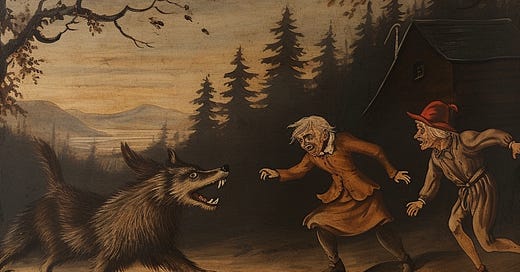




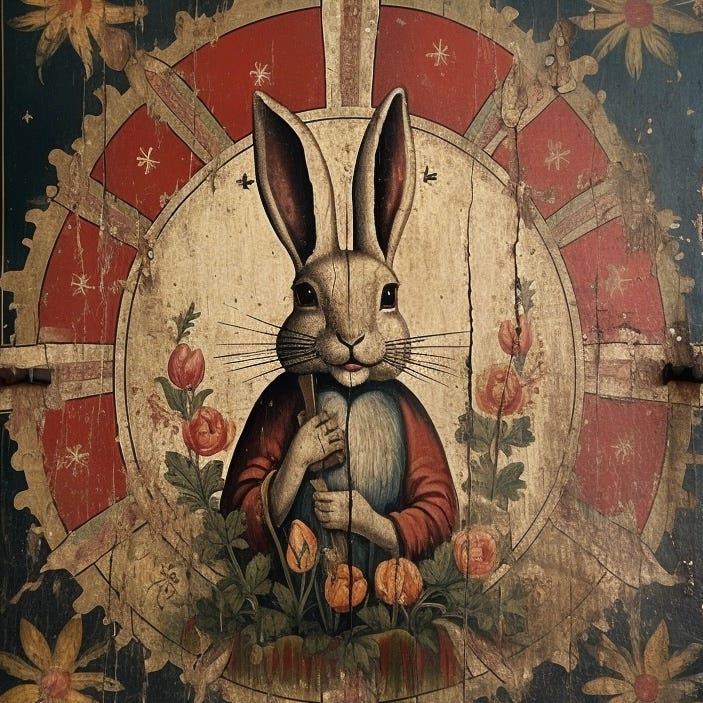

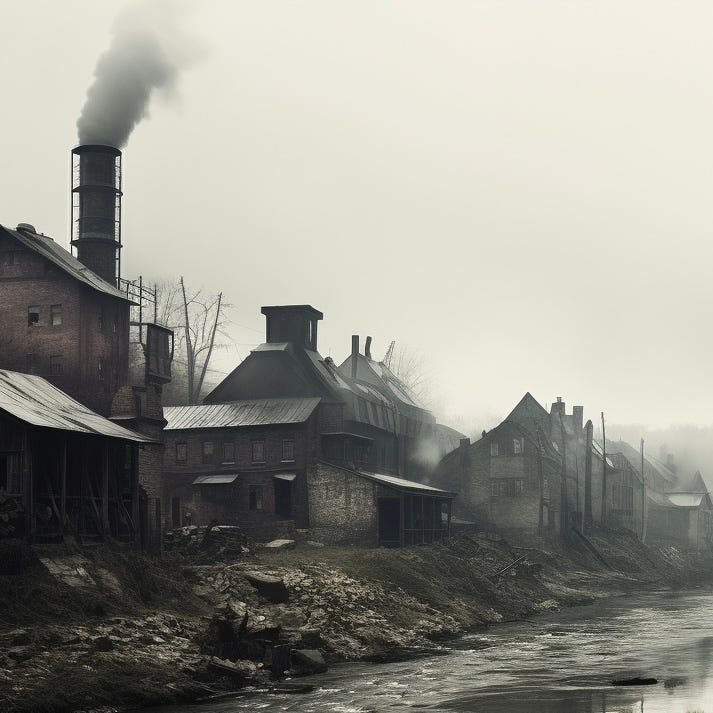
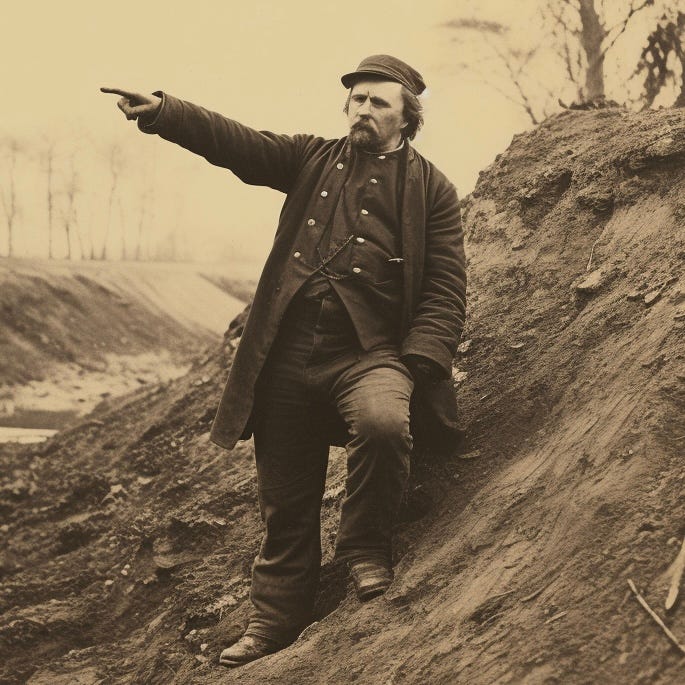
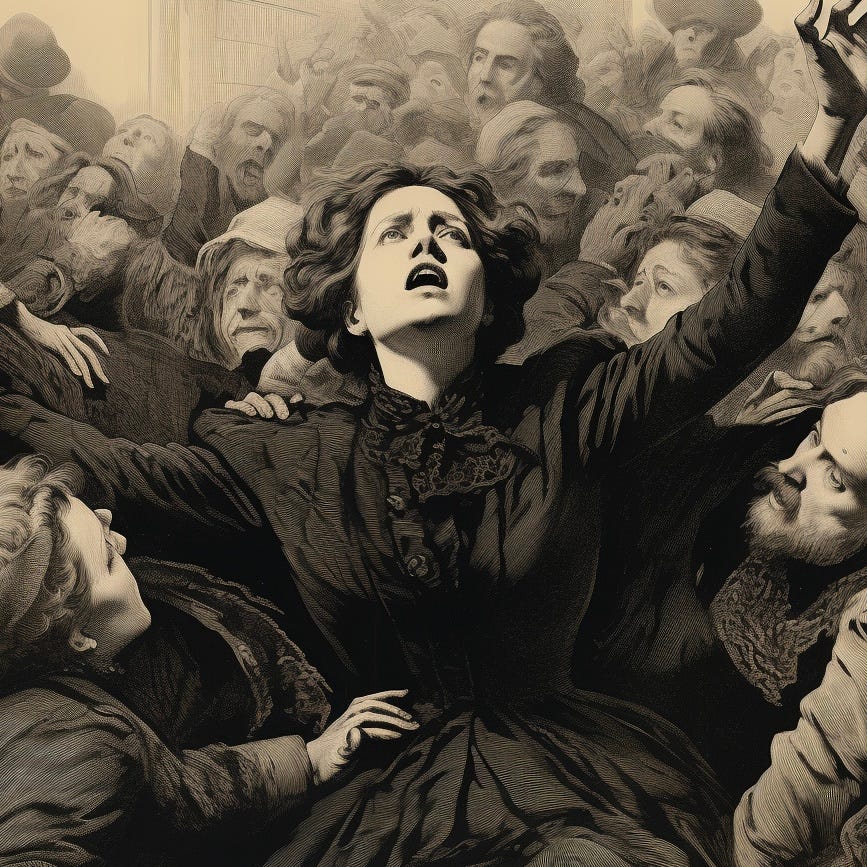


This was such a fraught and horrifying chapter, but I'm so impressed by your restraint in depicting the events and emotions in these scenes. For me, it lends them even more gravity.
Hard to carry such prose, Daniel, but expressed with great skill.